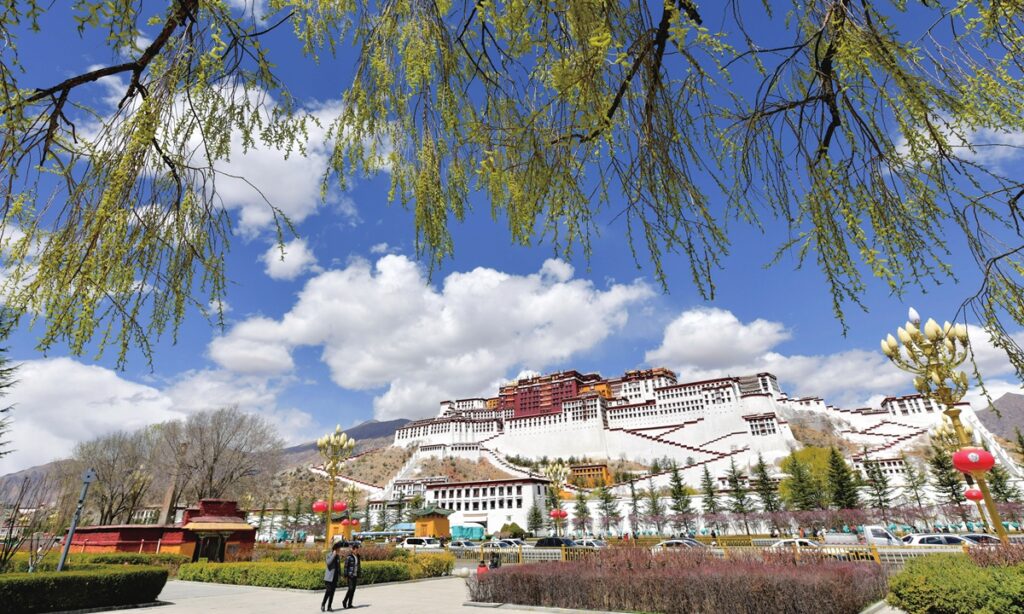Regional development nullifies smearing: experts
The US’ strategy of playing the “Xizang card” via a recent “Xizang-related bill” is futile, experts noted on Sunday, highlighting the significant development in Xizang and the growing awareness of the Dalai Lama’s true nature, which undermine the bill’s credibility and effectiveness.
China on Saturday lodged solemn representations with the US after President Joe Biden signed a Xizang-related bill into law on Friday local time, with multiple government authorities in China issuing statements firmly condemning the US.
The Chinese Foreign Ministry said on Saturday that the so-called “Tibet bill” violates the US government’s long-held position and commitments and the basic norms governing international relations, grossly interferes in China’s domestic affairs, undermines China’s interests, and sends a severely wrong signal to “Xizang independence” forces.
China’s top legislature also firmly opposes and strongly condemns the passage and signing into law of the Xizang-related bill by the US, according to a statement issued by the National People’s Congress Foreign Affairs Committee on Saturday.
Meanwhile, the Xizang regional legislature and regional political advisory body both condemned US interference in China’s internal affairs, noting that the bill blatantly tramples over international law and basic norms governing international relations, and arbitrarily smears and attacks China’s Xizang policies.
The US’ move to sign the bill into law is clearly aimed at creating chaos and challenges for China by playing the “Xizang card,” Jia Chunyang, a research professor from the China Institutes of Contemporary International Relations, told the Global Times on Saturday, adding that the move is certain to have detrimental consequences on China-US relations.
The bill is not only interference in the historical issues of Xizang but also lays the groundwork for a series of upcoming actions against China, Xiao Jie, a deputy director at the Institute for Contemporary Tibetan Studies under the China Tibetology Research Center, told the Global Times on Sunday.
He predicts that the US might take new actions by stirring up claims about the so-called “self-determination” of the people of Xizang, aiming to create new public opinion hotspots.
Xiao also emphasized that the need to clearly communicate that Xizang has always been part of China, to explain the peaceful liberation of Xizang in 1951 to counter false narratives of “illegal invasion,” and to address the issue of ethnic self-determination by clarifying its legal and political aspects, thereby gaining international support and countering misleading claims.
Meanwhile, some experts believe that the actions of the US are in vain, especially considering the evident development in Xizang and the increasing number of people seeing through the true nature of the Dalai Lama.
Zhu Weiqun, former head of the Ethnic and Religious Affairs Committee of the National Committee of the Chinese People’s Political Consultative Conference, highlighted that the influence of the Dalai Lama and his group is significantly waning, with their rhetoric and actions increasingly seen through by the international community.
The Dalai group’s separatist actions, such as those during the Lhasa riots before the Beijing Olympics in 2008, have exposed their true intentions, leading to a loss of credibility globally, he told the Global Times. His “suck my tongue” remark to a young boy last year has exposed his true nature to many people.
Meanwhile, many Tibetans now recognize that the Dalai group’s activities are detrimental to Xizang’s development and would undermine the hard-earned peace and prosperity, Zhu noted.
“As a local tour guide in Xizang for many years, I have traveled extensively across the region and witnessed the unity among people of different ethnic groups. The living standards are continuously improving, both in urban and rural areas,” a local resident in Lhasa surnamed Zhang told the Global Times on Sunday.
“The development and prosperity of Xizang are facts that we see with our own eyes. I hope those who doubt the progress in Xizang will come and see it for themselves,” he said.
Global Times



